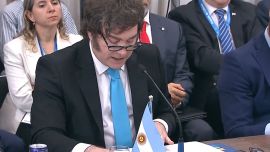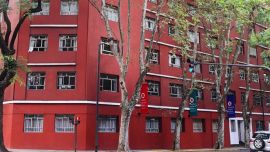President Alberto Fernández’s government has formally summoned Congress for extraordinary sessions to deal with a number of bills, most notably the impeachment of Supreme Court Justices Horacio Rosatti, Carlos Rosenkrantz, Ricardo Lorenzetti and Juan Carlos Maqueda.
The request to put the justices on trial, submitted to the lower house Chamber of Deputies, was submitted by 15 members of the ruling Frente de Todos coalition. It calls for the members of the nation’s highest tribunal to be summoned to testify before a congressional committee and says the justices should be impeached because of the court’s “poor performance.” Members of the Peronist front allege that the Supreme Court justices are favouring the opposition.
The deputies' bill runs a total of 410 pages. Most of them are Supreme Court rulings that are considered as evidence.
For the authors of the initiative, the aim of the impeachment is to "safeguard a healthy and independent administration of justice, which, due to the actions of those denounced here and the investiture they hold, has been seriously undermined, seriously affecting democratic institutions.”
The request is one of 29 bills included by Argentina’s government in its call for extraordinary sessions, which was filed Friday. The move is likely to reignite tensions with the Judiciary and stir up political hostilities with the opposition in an electoral year.
Extraordinary sessions will take place between January 23 and February 28, according to a decree published in the Official Gazette signed by President Alberto Fernández.
‘Attack on republican order’
Members of the Juntos por el Cambio coalition, the largest opposition bloc, responded immediately to the call. Rejecting the initiative, they accused the government of "attacking the republican order" and threatened to paralyse Congress in response.
The ruling party has the simple majority needed to begin the investigation stage in committee, which can be extended for 60 days. However, it lacks the two-thirds majority needed in both the Chamber of Deputies and the Senate to move forward with the impeachment and potential removal of the four court judges.
The tribunal’s fifth seat is currently vacant, following the 2021 resignation of Supreme Court Justice Elena Highton de Nolasco.
The impeachment bill argues that the court "has made arbitrary attacks on the constitutional powers assigned" to the executive and legislative branches of government.
Since taking office, President Alberto Fernández has regularly outlined his desire to carry out widespread judicial reform.
The conflict between the executive and the court escalated in December when the Supreme Court ruled in favour of the Buenos Aires City government in a dispute over the distribution of federal tax revenues.
Slamming the decision, President Fernández branded it “a political ruling in the face of an election year," referring to the upcoming October general elections for which City Mayor Horacio Rodríguez Larreta is emerging as a likely presidential candidate for the opposition.
The impeachment bill also cites the so-called ‘Lago Escondido scandal,’ which broke at the end of last year. Local media outlets reproduced leaked messages of the Telegram messaging service that exposed a direct relationship between the Rosatti’s spokesperson and Marcelo D'Alessandro, a key City Hall minister who later requested a leave of absence as the scandal broke.
‘Hostile rhetoric’
Fernández has promised to push for an expansion of the court’s membership and a judicial reform that made no concrete progress, issues that he again included in the call for extraordinary sessions.
The government also resubmitted an initiative to expand the court from five to 15 members with gender equity, a bill that was approved in September by the Senate but later stalled in the Chamber of Deputies. It is also pushing for changes to the Council of the Magistrates, the body that fires and hires judges, as well as addressing the long-delayed appointment of an attorney general.
The push for impeachment of the court was described earlier this week as an "assault on the rule of law" by international NGO Human Rights Watch (HRW) in its 2022 report.
In Argentina, "hostile rhetoric toward judges by authorities, delays in the appointment of judges and other high-level authorities, and corruption, also present in the Judiciary, have progressively undermined the rule of law," the Washington-based group said.
The criticism was met with a firm response from the government.
"It is the Argentine justice system that undermines the rule of law when a group of judges meet with a newspaper businessman and officials to organise court rulings and then set up cover-up attempts," Presidential Spokeswoman Gabriela Cerruti said at her weekly press conference.
The spokeswoman was referring to the ‘Lago Escondido’ scandal, which also revealed a controversial October 13 trip by a group of judges, prosecutors and D’Alessandro, the City Hall official, who flew by private plane to British millionaire Joe Lewis's ranch in Patagonia.
Leaked chat messages between the group later showed that they had discussed strategies to conceal the meeting if it came to light.
– TIMES/AFP/PERFIL




















Comments